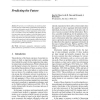Free Online Productivity Tools
i2Speak
i2Symbol
i2OCR
iTex2Img
iWeb2Print
iWeb2Shot
i2Type
iPdf2Split
iPdf2Merge
i2Bopomofo
i2Arabic
i2Style
i2Image
i2PDF
iLatex2Rtf
Sci2ools
MICRO
2000
IEEE
2000
IEEE
Predicting the Future
We present a novel methodology for predicting future outcomes that uses small numbers of individuals participating in an imperfect information market. By determining their risk attitudes and performing a nonlinear aggregation of their predictions, we are able to assess the probability of the future outcome of an uncertain event and compare it to both the objective probability of its occurrence and the performance of the market as a whole. Experiments show that this nonlinear aggregation mechanism vastly outperforms both the imperfect market and the best of the participants. We then extend the mechanism to prove robust in the presence of public information. Key Words. information aggregation, information markets, public information, experimental economics, mechanism design
Related Content
| Added | 19 Dec 2010 |
| Updated | 19 Dec 2010 |
| Type | Journal |
| Year | 2000 |
| Where | MICRO |
Comments (0)

